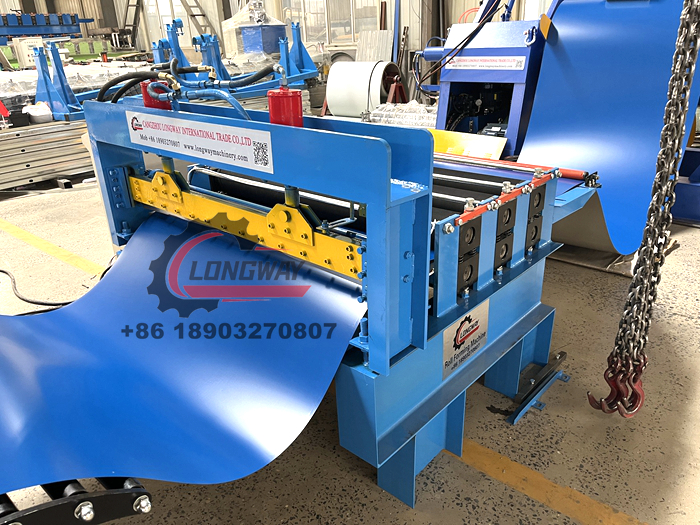roll forming line machine company
The Evolution of Roll Forming Line Machine Companies A Comprehensive Overview
Roll forming line machines play a crucial role in the manufacturing industry, particularly in the production of metal components with high precision and efficiency. As the demand for customized metal profiles grows across various sectors, the significance of roll forming line machine companies has become increasingly evident. This article explores the dynamics of the roll forming industry, the technological advancements in machinery, and the future outlook of these companies.
Understanding Roll Forming
Roll forming is a continuous bending operation in which a long strip of metal, often sheet steel, is passed through a series of rollers that progressively shape it into a desired cross-section. This process is particularly favored for its ability to produce complex shapes with tight tolerances and minimal waste. Industries such as automotive, construction, and appliance manufacturing heavily rely on roll-formed components due to their strength, durability, and lightweight nature.
The Role of Roll Forming Line Machine Companies
The success of roll forming hinges on the expertise of the companies that design and manufacture these specialized machines. Roll forming line machine companies have evolved significantly over the years, integrating advanced technology to enhance production efficiency and product quality. Today’s machines are equipped with features such as computer numerical control (CNC) systems, which allow for precise adjustments to the forming process and real-time monitoring of production metrics.
Technological Advancements
Recent technological advancements have transformed the capabilities of roll forming line machines. Automation has become a defining trend, replacing manual processes with robots and automated feeding systems. This shift minimizes the risk of human error, increases production speeds, and reduces labor costs. Moreover, the integration of artificial intelligence and machine learning enables predictive maintenance, whereby machines can anticipate potential failures before they occur, thus minimizing downtime and maintenance costs.
Additionally, the rise of Industry 4.0 has brought about significant changes in how roll forming companies operate. The use of IoT (Internet of Things) devices allows for real-time data collection and analysis, giving manufacturers insights into their production processes. This data-driven approach enhances decision-making and facilitates continuous improvement, leading to more efficient production processes.
roll forming line machine company

Customization and Flexibility
As markets demand ever-increasing levels of customization, roll forming line machine companies have adapted by providing flexible solutions. Modern roll forming machines are designed to accommodate various materials and thicknesses, enabling manufacturers to produce a wide range of products. This flexibility is essential in industries such as construction, where tailored solutions are often required to meet specific project needs.
Moreover, companies are increasingly offering modular designs for their roll forming lines, allowing manufacturers to easily modify their equipment as their production needs change. This adaptability ensures that businesses can remain competitive in a rapidly evolving marketplace.
Sustainability and Environmental Considerations
Another critical aspect driving the evolution of roll forming line machine companies is the emphasis on sustainability. With growing awareness of environmental issues, manufacturers are seeking ways to reduce their carbon footprint. Roll forming is inherently efficient in terms of material usage, but companies are also exploring eco-friendly materials and energy-efficient production methods. The adoption of renewable energy sources, like solar or wind, to power manufacturing facilities is becoming more common.
Future Outlook
Looking ahead, the roll forming industry is poised for continued growth. The increasing demand for lightweight materials in automotive and aerospace applications, coupled with the need for energy-efficient construction solutions, suggests a bright future for roll forming line machine companies. As these companies embrace innovation and sustainability, they will be well-equipped to meet the challenges of the evolving market landscape.
In conclusion, roll forming line machine companies are at the forefront of an industry marked by technological advancements and increasing customization demands. Their ability to adapt to changing market needs, embrace sustainability, and leverage automation will define their success in the years to come. As the manufacturing landscape continues to evolve, these companies will remain pivotal in shaping the future of production across various sectors.
-
Roof Panel Machines: Buying Guide, Types, and PricingNewsJul.04, 2025
-
Purlin Machines: Types, Features, and Pricing GuideNewsJul.04, 2025
-
Metal Embossing Machines: Types, Applications, and Buying GuideNewsJul.04, 2025
-
Gutter Machines: Features, Types, and Cost BreakdownNewsJul.04, 2025
-
Cut to Length Line: Overview, Equipment, and Buying GuideNewsJul.04, 2025
-
Auto Stacker: Features, Applications, and Cost BreakdownNewsJul.04, 2025
-
Top Drywall Profile Machine Models for SaleNewsJun.05, 2025








